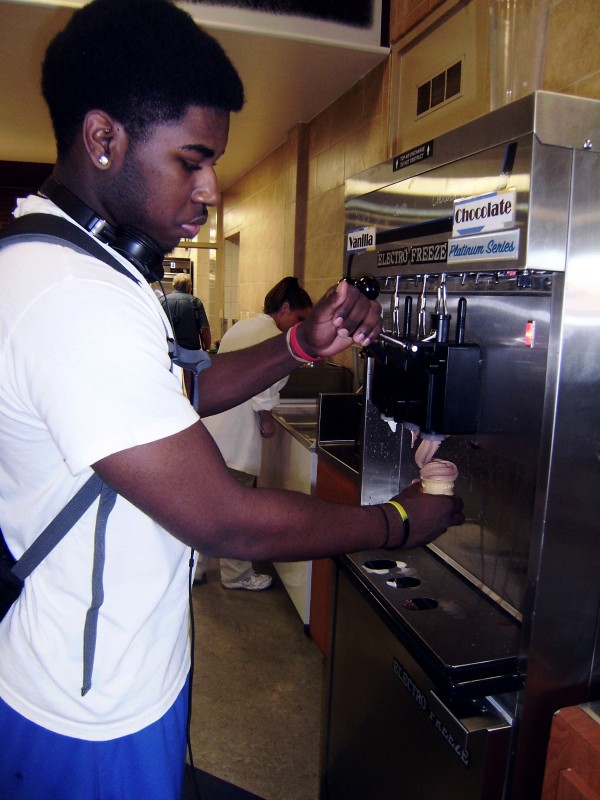
College students generally plan to gain knowledge, experiences and even friends during their freshman year.
However, what they don’t plan on gaining is an extra 15 pounds.
The college experience paves the way for a variety of unhealthy habits.
From busy schedules without time for exercise or sufficient sleep to late-night snacking and ample alcohol consumption, students must work hard to stay healthy in a campus setting.
“When I was a freshman, I knew I wanted to get into a routine of working out,” said Otisa Eads, junior from Louisville, Ky. “So, of course what happens is you get here and you work out every single day for a month, and then you stop because, you know, life actually happens. So, I didn’t work out after that because I had a job and I didn’t have time.”
The college lifestyle can tug at every second students have, and Eads said time challenges her attempts at a healthy regime.
“Having a job and also going to class make it so that you’re not as available to work out every day at the same time,” Eads said. “Or maybe by the time you want to work out it’s too late. Whatever the conflict is, time and managing time is usually (the biggest challenge).”
Many students find it difficult to fit in healthy excercise habits amidst the busy day-to-day activities of a cram-packed schedule.
“I feel like sometimes you put (a healthy lifestyle) last,” Eads said. “You know, I’ve got this, this and this. I’ve got to work here and then eat and then I’m done. I know that I, personally, put working out last at the end of my day.”
Murray State provides several ways to keep students, faculty, and staff in shape.
The Racer Wellness incentive program encourages faculty and staff to participate in health exams and yoga classes.
Free workout classes, intramural sports and long Wellness center hours stimulate the workout regiments of students.
Edem Sededji, graduate student from Togo, West Africa, works at the front desk of the Wellness center three days a week.
“I see about 100 to 150 people (come through the doors) each day,” Sededji said.
The times the Wellness Center is open, as well as the times of fitness classes, are posted on the Murray State website.
“We have a class schedule with the classes people can come to — Zumba and Cycling have the highest attendance,” Sededji said. “In Zumba they play music, so it’s people dancing around and cycling in a room full of bicycles. I think they’re both good workouts and a lot of fun, especially Zumba. People love Zumba.”
People may love Zumba, but the University also provides options for the rhythmless Racers with two left feet.
“I did Zumba once, but I wasn’t very good at it,” Courtney Futrell, sophomore from Huntsville, Ala., said. “I did play intramural soccer and intramural flag football for Regents last year. Intramural sports (are) at least something.”
Snacking calories also add up quickly, and students face pressure to snack conveniently rather than efficiently.
“As a junior I have changed, but I pretty much snack more on campus, and drink all my calories,” Eads said, “Because, you know, we love our Frappuccinos and our Creamices, or whatever they’re serving at Starbucks. We like brownies and cookies, something that’s packaged and easy to go, but that’s what all your calories go to.”
Eads said she tries to limit the days she eats fast food.
A study published in Social Science Quarterly’s Dec. 2011 issue found that the freshman 15 is actually a myth. Freshmen on average gain only 2.5 to 3.5 pounds.
The freshman 15 could be true for some students, false for some students, and some lucky students could actually lose a few pounds.
The important thing is that students take initiative when it comes to improving their health.
“I just think it’s the students’ (responsibility to stay healthy),” Sededji said, “There’s already the Wellness Center to work out, so (Murray State) can’t really come knock down your doors telling you to work out.”
The combination of the University facilitating a healthy environment and students taking control over their bodies promotes Murray State health.
“The responsibility should be on the students because it’s their bodies,” Eads said. “It would make it even better if Murray State could offer more choices in healthy food, keep up the awesome programs (like intramural sports) and keep up the great job at the Wellness center with the different activities. All of that together could make a great team.”
Pop Culture may indicate unhealthy lifestyles overtaking college campuses everywhere, but Murray State will continue to fight for spinach, salsa workouts and sleep.
Story by Maddie Mucci, Contributing writer.